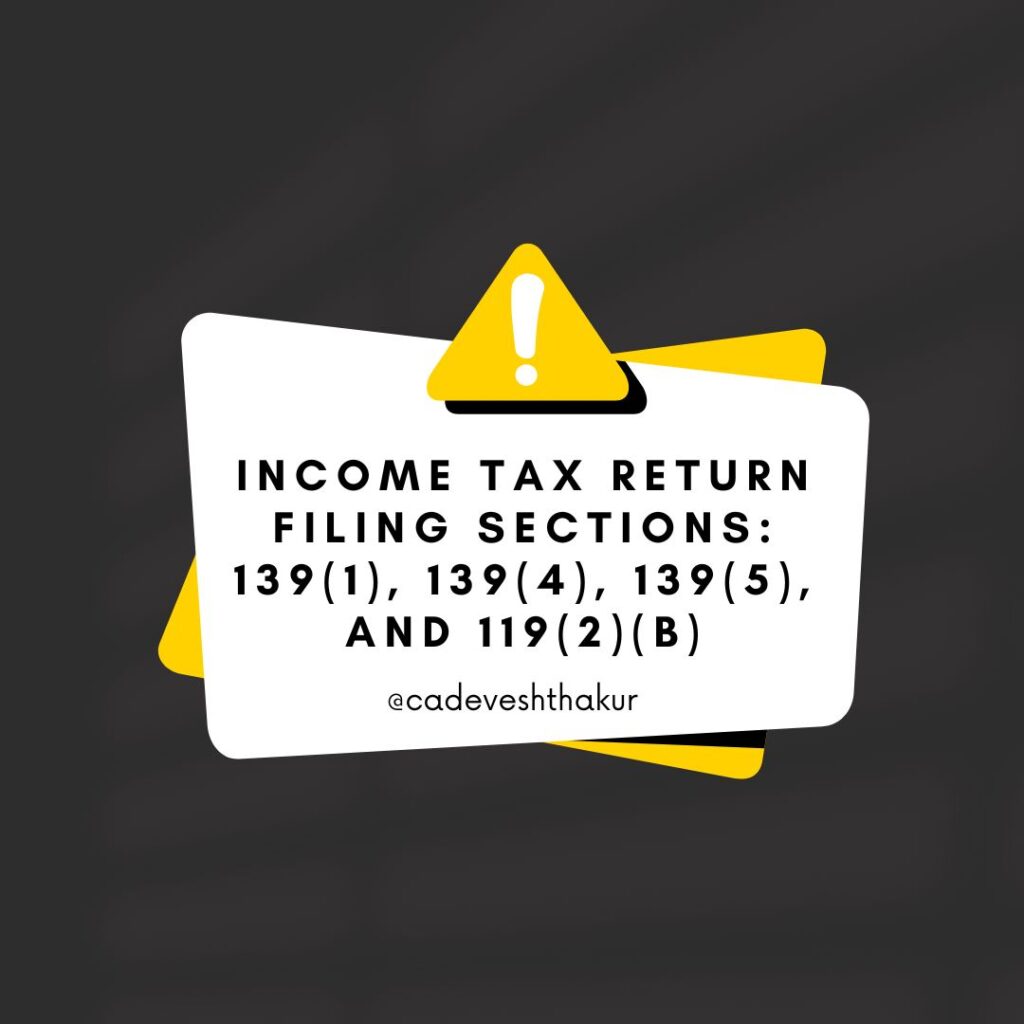Explanation of Income Tax Return Filing Sections: 139(1), 139(4), 139(5), and 119(2)(b)
Income tax return filing involves several sections and provisions under the Income Tax Act. Sections 139(1), 139(4), 139(5), and 119(2)(b) are essential in understanding the timelines, revision, and condonation of delays. Here is an elaborate explanation along with examples and important case laws:
1. Section 139(1) – On or Before Due Date:
Explanation: Section 139(1) mandates individuals to file their income tax returns on or before the due date specified by the Income Tax Act. This section outlines the normal filing procedure for taxpayers.
Examples:
- Salaried Individual:
- Mr. A, a salaried individual, files his income tax return for the financial year 2023-24 on or before the due date, i.e., July 31, 2024.
- Business Owner:
- Ms. B, a business owner, submits her income tax return on or before the due date for the assessment year 2024-25.
Important Case Laws:
- Commissioner of Income Tax vs. Anjum M.H. Ghaswala (2001):
- Significance: The Supreme Court held that filing the return within the due date is crucial, and failure to do so may lead to penalties.
- Shyam Sunder Jindal vs. Income Tax Officer (2016):
- Significance: The Delhi High Court emphasized the importance of timely filing under Section 139(1) to avoid penal consequences.
2. Section 139(4) – After Due Date:
Explanation: Section 139(4) allows taxpayers to file their income tax returns after the due date but within the stipulated time frame. However, this provision attracts late filing fees.
Examples:
- Late Submission:
- Mr. C files his income tax return for the assessment year 2024-25 on August 15, 2024, missing the original due date of July 31, 2024.
- Business Owner’s Delay:
- Ms. D, a business owner, fails to file her return by the due date but submits it on September 10, 2024, availing the provisions of Section 139(4).
Important Case Laws:
- CIT vs. Praveen Chopra (2012):
- Significance: The Delhi High Court upheld the imposition of late filing fees under Section 234F for returns filed beyond the due date.
- A. K. P. C. Vs. ACIT (2017):
- Significance: The Bangalore ITAT clarified that the taxpayer can file a belated return within the specified time, but late filing fees would be applicable.
3. Section 139(5) – Revised Return:
Explanation: Section 139(5) allows taxpayers to revise their original income tax returns if they discover any omission or mistake. This provision ensures rectification and correction of errors.
Examples:
- Omitted Deduction:
- Mr. E realizes that he omitted to claim a deduction while filing the original return. He subsequently files a revised return including the missed deduction.
- Correction of Income Details:
- Ms. F, a taxpayer, identifies an error in reporting her income and files a revised return to rectify the mistake.
Important Case Laws:
- Goetze India Ltd. vs. CIT (2006):
- Significance: The Supreme Court emphasized that the right to file a revised return is a statutory right, and taxpayers can rectify errors to avoid litigation.
- Smt. Leela J. Veluswamy vs. ACIT (2017):
- Significance: The Chennai ITAT held that the taxpayer has the option to revise the return within the prescribed time limit.
4. Section 119(2)(b) – After Condonation of Delay:
Explanation: Section 119(2)(b) provides the Income Tax Department with the authority to condone the delay in filing returns under certain circumstances, allowing taxpayers to submit returns even after the specified due dates.
Examples:
- Genuine Reason for Delay:
- Mr. G faces genuine hardships preventing him from filing his return on time. The Income Tax Department, considering the circumstances, condones the delay.
- Technical Glitch:
- Ms. H encounters technical issues preventing her from filing on time. Upon application to the department, the delay is condoned under Section 119(2)(b).
Important Case Laws:
- ICICI Bank Ltd. vs. DCIT (2017):
- Significance: The Mumbai ITAT held that the department can condone the delay if the taxpayer provides a reasonable cause for late filing.
- ITO vs. M/s Organic India Pvt. Ltd. (2014):
- Significance: The Delhi ITAT emphasized that the department should consider the genuineness of the reasons provided by the taxpayer before condoning the delay.
Conclusion:
Understanding the implications and provisions of Sections 139(1), 139(4), 139(5), and 119(2)(b) is crucial for taxpayers to comply with filing deadlines and rectify errors. While these sections provide flexibility in certain situations, taxpayers should exercise diligence to avoid penalties and ensure timely compliance with the Income Tax Act.
